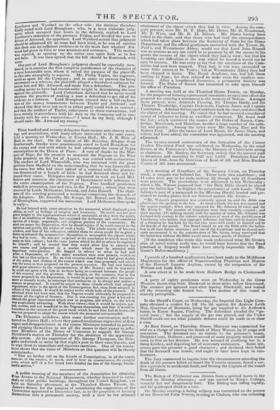Three hundred and seventy delegates from various anti-slavery meet- ings
and associations, with ninny others interested in the same cause, held a meeting on Wednesday, at Exeter Hull ; Mr. J. N. Blair of Bath in the chair. On the motion of Mr. Beverley, delegate from Scarborough, thanks were unanimously voted to Lord Brougham for the energy and zeal with which he had advocated the cause of Negro emancipation in the House of Peers. A vote of thanks to the Mar- quis of Sligo, for his promise to manumit the Negroes on his West India property on the 1st of August, was carried with acclamation. The conduct of Lord Wharncliffe, who was intrusted with the great petition from Sheffield on the understanding that he was favourable to the cause, but who had since talked of a contract with the planters, was denounced as a breach of faith : he had deceived them and be- trayed their cause. Delegates were appointed to wait on Lord Mel. bourne and ascertain the :ntentions of Government with reference to the entire emancipation of the Negroes. Five hundred gentlemen walked in procession, two and two, to the Treasury ; where they were received by Lords Melbourne, Glenelg, and John Russell. The chair- man of the meeting presented a memoriel comprising the demands of the delegates. Dr. Greville, Mr. Surge, Alr. Burnet, and Mr. James of Birmingham, supported the memorial. Lord Melbourne then spoke in reply— He had listened with great attention to the memorial, which displayed great ability, as well as feelings of religion and humanity. He could nut but give great weight to the representations which it contained, as they were the result, Lot uf an ebullition of feeling, but expressed the deliberate and well-considered opinion of a large, respectable, and religious portion of the community. He need not assure the Deputation, that he should rejoice if he could concur in the opinions and gratify the wishes of such a body. The whole course of his own conduct, and that of his colleagues, entitled them to claim credit for as great a desire as actuated the memorialists themselves to accomplish the objects which they had in view. He was not surprised at the conclusion to which many had come on this subject; but the same justice which he did to others he expected for himself ; and he trusted that they would allow him to exercise his own reason and judgment in a matter which must be attended with important consequences. He begged to advert to what he had said when a Deputation, of which many members were now present, waited on him last on this subject. He on that occasion stated that he had great doubts of the policy and wisdom of the course which was then proposed, and which was the same as that proposed on the present occasion. He had now listened with great attention to the representations of Mr. Hornet; and be was sorry he could not agree with him as to there being no contract between the people of this couutry and the planters. He thought, on the contrary, that in the course proposed by the Deputation, it would be great injustice, after the settle- ment GO recently made, to interrupt that settlement in so abrupt and sudden a manner as proposed. It would be unjust to those islands which had adopted regulations, more in the spirit of the Emancipation Act, than those adopted in others of the islands. It would be unjust to the whole body of the planters. He admitted what had been said, that the Negroes would ultimately be prepared to ,exercise all the rights of freemen. But it was running too great a hazard to .diaturb the great experiment which was in progress, and which on the whole Ir.as auspiciously advancing. With these views—that it would be unjust, pr- ima, unwise, and not beneficial to the Negroes themselves, and that it would be hazardous to the success of the great cause which he and they had at heart—he Ins not prepared to adopt the course which the memorial recommended. The Delegates withdrew, after some further conversation, and re- turned to Exeter Hall ; where they passed resolutions expressive of deep regret and disappointment at the course Ministers intended to pursue, and pledging themselves to use all the means in their power to influ- ence Members of the House of Commons to support Sir George Strickland's motion on Thursday for the abolition of the apprentice- ship system. At the suggestion of Mr. George Thompson, the Dele- gates undertook to write by that night's post to their constituents, and to urge them to immediate and vigorous exertions. One of the resolu- tions shows that the votes of Members on this question will be closely scrutinized- " That we further call on the friends of Emancipation, in all the consti- tuencies of the empire, to ?nark, and to bear in remembrance, the eventful voles, which will in a few hour. have decided the fate of Sir George Snick- Jead'a motion."


























 Previous page
Previous page